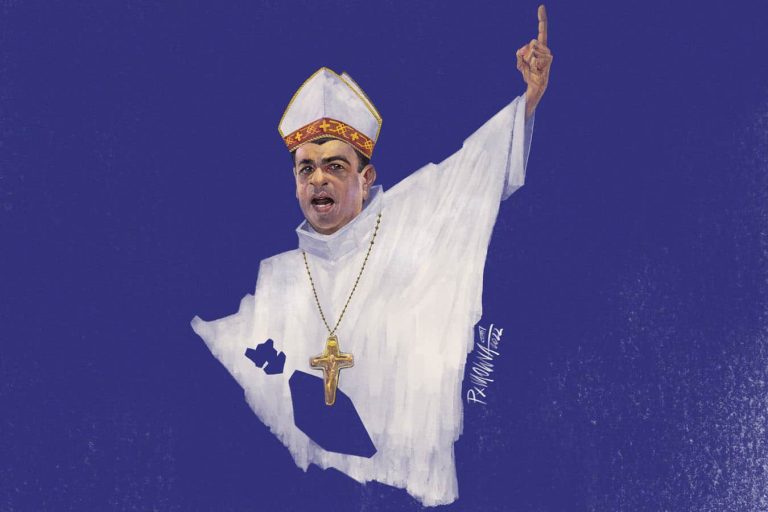11 de julio 2023

Children of Exile: The Births “Sowing Hope” in the Camp of Nicaraguan Farmers

PUBLICIDAD 1M
PUBLICIDAD 4D
PUBLICIDAD 5D
Monsignor Rolando Alvarez once again laid bare the perversity of the Nicaraguan regime

Monsignor Rolando Álvarez is the first bishop in the history of Nicaragua to be a political prisoner. Illustration: PxMolina
Monsignor Rolando Alvarez, bishop of Matagalpa since 2011 and apostolic administrator of Esteli as of 2022, is a resolute preacher. His courage, integrity, and endurance, but above all the deep commitment shown to his people, the Catholic Church, and Nicaragua, have made him the target of the worst possible aberrations of the dictator Daniel Ortega. But with each new blow, he resists and raises up as a whole being, as an upright priest and a symbol of freedom.
His struggle synthesizes the best aspirations of Nicaraguans, and his collected heroism reveals an inexhaustible source of perseverance against which the tyranny is perplexed and disoriented. And since it knows no other way to govern, it responds with fierce repression.
The most recent example of Monsignor Alvarez’s fortitude and of dictator Ortega’s pettiness became evident this week. As if it were a gracious concession worthy of gratitude, and after negotiations with the Vatican, the Episcopal Conference, and even Brazilian President Luiz Inacio Lula da Silva, the regime offered to release him.
The regime took him out of the cell he has been suffering since February when he was sentenced to 26 years and 4 months in prison for “treason” and other spurious charges. The move seemed to be a masterstroke for those oppressing Nicaragua: they would get rid of an annoying figure, deflate his status as a symbol, present a humanitarian image, accommodate some international characters, and appease the Vatican.
But they did not count on the leading actor: Monsignor Alvarez himself. Despite the suffering already accumulated in prison, he steadfastly refused the conditions imposed for his release. These were, in synthesis, not to recognize his innocence, to strip him of his Nicaraguan nationality (he was born in Managua in 1966), and to expel him expeditiously to Rome.
Alvarez had already rejected these requirements when, on February 9th, he refused to be part of the group of 222 political prisoners released, exiled, and rendered stateless by the regime. For this position, the following day, he received the extreme sentence he is still serving. Perhaps Ortega and his cronies thought that the months enduring prison had broken him. They were wrong.
Undoubtedly physically weakened, his spiritual strength and personal fortitude were rather accentuated. For this reason, he maintained his attitude: unconditional release for himself and the other imprisoned priests and the right to remain in the country. He said that he would accept to leave only if Pope Francis ordered him to do so, but the Pope has not issued such an order. Bishop Alvarez also asked to unfreeze the bank accounts of the Nicaraguan churches and dioceses and to cease the religious persecution. The regime’s refusal meant his return to prison.
The direct extreme cruelty against Monsignor Alvarez began in May of last year after he denounced the regime’s persecution against him in a video. In protest, he began an indefinite fast. On August 4th, he was prevented from leaving the episcopal palace in Matagalpa to officiate mass. He remained there until, two weeks later, the police broke into the building and arrested him along with eight priests. He was placed under house arrest in Managua until his speedy trial and sentencing on February 10th.
Faced with the regime’s perversity, Monsignor Alvarez has displayed his endurance to withstand Ortega’s insults. On that day the dictator called him a “maniac” and a “terrorist,” but he has shown serenity; and despite the attempts to humiliate him, his expressions of absolute dignity are infinite.
Thanks to this resolute preacher, Ortega and his cronies have been left more exposed and isolated than ever. For them, our repudiation; for him, our respect, admiration, and solidarity. What must follow is a more belligerent international support demanding freedom in Nicaragua. Perhaps the example of Rolando Alvarez will stimulate it.
*Editorial from La Nación
This article was originally published in Spanish in Confidencial and translated by Havana Times.
PUBLICIDAD 3M
Diario costarricense, fundado en 1946. Su primera versión electrónica (nación.com) se publicó en abril de 1995. Desde junio de 2015 implementa un sistema de suscripción digital.
PUBLICIDAD 3D